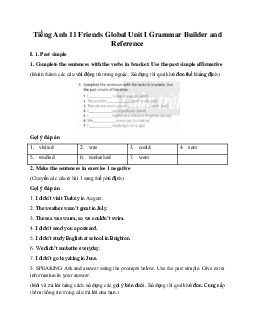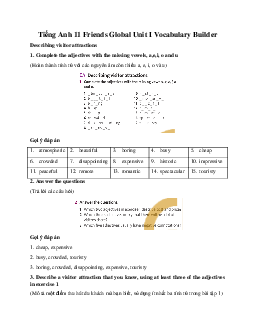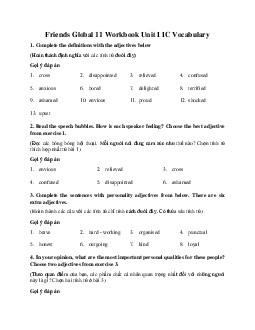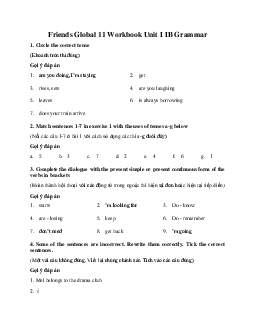




Preview text:
Tiếng Anh 11 Friends Global Unit Introduction ID Grammar
1. SPEAKING Look at the photo in pairs. Is this an activity you enjoy? Why? / Why not?
(Nhìn vào bức ảnh theo cặp. Đây có phải là một hoạt động bạn thích? Tại sao? / Tại sao không?) Gợi ý đáp án
A: What activity can you see in the picture?
B: Going for a bike ride, I guess.
A: I agree. Is this an activity you enjoy?
B: Yes, of course. Riding a bike is good for our body and muscles. Moreover, it helps me
relax and feel free. I often go for a bike twice a week.
2. In pairs, read the dialogue and decide whether each gap should be a / an, the or –
(no article). Write your answers.
(Theo cặp, đọc đoạn hội thoại và quyết định xem mỗi chỗ trống có nên là a / an, the hoặc
– (không có mạo từ). Viết các đáp án của bạn.) Gợi ý đáp án 1. the 2. a 3. the 4. - 5. the 6. the 7. a 8. - 9. an 10. the 11. - 12. the
3. Listen and check your answers. When are Toby and Leah going to do the activity in the photo?
(Lắng nghe và kiểm tra những câu trả lời của bạn. Khi nào Toby và Leah sẽ thực hiện hoạt động trong ảnh?) Gợi ý đáp án
Toby and Leah are going to do the activity in the photo in the afternoon on Sunday.
4. Studying the use of articles in the dialogue. Complete the Learn this! Box with a /
an, the or – (no article).
(Nghiên cứu việc sử dụng mạo từ trong hội thoại. Hoàn thành phần khung Learn this! với
a / an, the hoặc – (không có mạo từ).) Gợi ý đáp án 1. a/ an 2. the 3. the 4. a/ an 5. - 6. a/ an 7. the 8. the
5. Complete the sentences with a / an, the or – (no article). Use rules in the Learn
this! box to explain your answers.
(Hoàn thành các câu với a / an, the hoặc – (không có mạo từ). Sử dụng các quy tắc trong
phần Learn this! để giải thích câu trả lời của bạn.) Gợi ý đáp án 1. a - the 2. -/ a 3. an - the - an 4. a - the
6. Read the Learn this! box. Then underline an example of each of the uses of will
and be going to in the dialogue.
(Đọc khung Learn this! Sau đó gạch dưới một ví dụ về mỗi cách sử dụng will và be going
to trong đoạn hội thoại.) Gợi ý đáp án
- I’m going to go for a bike ride on Saturday.
=> be going to diễn tả một kế hoạch đã được quyết định từ trước.
- I'm going to help my dad with some gardening. We're going to do some work for a neighbor.
=> be going to diễn tả một kế hoạch đã được quyết định từ trước.
- And according to the forecast,the weather isn't going to be good.
=> be going to diễn tả một dự đoán dựa trên thông tin dự báo thời tiết.
- But the neighbor is going to pay us for it.
=> be going to diễn tả một dự đoán dựa trên những thông tin nghe được. - I'll come and help you.
=> will diễn tả quyết định phải làm gì khi đang nói.
- We’ll share money with you
=> will diễn tả quyết định phải làm gì khi đang nói.
- I’ll go on Sunday instead. The weather will probably be better than.
=> will diễn tả quyết định phải làm gì khi đang nói.
- I will be exhausted when I wake up!
7. Complete the sentences with the correct form of will or be going to and the verbs
in brackets. Write which rule in the Learn this! box you are following.
(Hoàn thành các câu với dạng đúng của will hoặc be going to và động từ trong ngoặc.
Viết quy tắc nào trong khung Learn this! bạn đang làm theo.) Gợi ý đáp án 1. isn’t going to stop
2. are going to spend - will have
3. am going to spend - will have 4. am going to - won’t be
Lời giải chi tiết
1. That train isn’t going to stop (not stop) here - It's going too fast.
(Con tàu đó sẽ không dừng ở đây - Nó đang đi quá nhanh.)
=> be going to diễn tả dự đoán dựa trên thông tin nghe hoặc thấy được.
2. ‘We are going to spend (spend) the weekend in Paris.’
(Chúng tôi sẽ dành cuối tuần ở Paris.)
‘Lucky you. You will have (have) a great time!’
(Bạn thật may mắn. Bạn sẽ có một thời gian tuyệt vời!)
=> Vị trí 1: be going to diễn tả một kế hoạch đã được quyết định từ trước.
=> Vị trí 2: will diễn tả dự đoán dựa trên những gì mình biết.
3. ‘Help! I am going to drop (drop) one of these boxes.’
(Giúp với! Tôi sắp đánh rơi một trong những chiếc hộp này.)
‘Don't worry. I will take (take) one for you.’
(Đừng lo lắng. Tôi sẽ lấy một cái cho bạn.)
=> Vị trí 1: be going to diễn tả dự đoán dựa trên thông tin thấy được.
=> Vị trí 2: will dùng để đưa ra quyết định trong lúc nói.
4. I am going to (go) into town this afternoon. But I won’t be (not be) home late, I promise.
(Tôi sẽ vào thị trấn chiều nay. Nhưng tôi sẽ không về nhà muộn đâu, tôi hứa đấy.)
=> Vị trí 1: be going to diễn tả một kế hoạch đã được quyết định từ trước.
=> Vị trí 2: will dùng để đưa ra quyết định trong lúc nói.
8. SPEAKING PRONUNCIATION. Work in pairs. Take turns to ask and tell your
partner about your plans for your next summer, using will and be going to.
Remember to pronounce the weak or strong forms of will, am, is, are appropriately.
(Làm việc theo cặp. Thay phiên nhau hỏi và nói với đối tác của bạn về kế hoạch cho mùa
hè tới của bạn, sử dụng will và be going to. Nhớ phát âm dạng yếu hoặc mạnh của will,
am, is, are một cách thích hợp.) Gợi ý đáp án
A: Do you have any plans for your summer vacation?
B: Not yet! How about you? Are you staying at home or going away?
A: My family is going to travel to Vung Tau beach in June. My father booked a car for us yesterday.
B: That’s nice! I believe you’ll have a great time there. How long will you and your family be there?
A: I’m not sure. Maybe 2 days and 1 night. We’ll swim, take pictures, have barbecues
and play interesting outdoor games. It’ll be fun!
B: Sounds interesting. I’ll make a detailed plan for my summer holiday.




